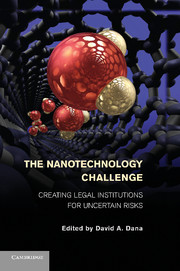Book contents
- Frontmatter
- Contents
- Contributors
- Part I Introduction
- Part II Public Perceptions of Nanotechnology Risks
- Part III Meeting the Nanotechnology Challenge by Creating New Legal Institutions
- 5 Toward Risk-Based, Adaptive Regulatory Definitions
- 6 The Missing Market Instrument
- 7 Conditional Liability Relief as an Incentive for Precautionary Study
- 8 Transnational New Governance and the International Coordination of Nanotechnology Oversight
- 9 Labeling the Little Things
- 10 Public Nuisance
- 11 Enlarging the Regulation of Shrinking Cosmetics and Sunscreens
- 12 Accelerating Regulatory Review
- 13 The Ethical Issues in Nanotechnology
- Part IV Where We Are Now – The Current Framework for Nanotechnology Regulation
- Index
- References
7 - Conditional Liability Relief as an Incentive for Precautionary Study
Published online by Cambridge University Press: 05 December 2011
- Frontmatter
- Contents
- Contributors
- Part I Introduction
- Part II Public Perceptions of Nanotechnology Risks
- Part III Meeting the Nanotechnology Challenge by Creating New Legal Institutions
- 5 Toward Risk-Based, Adaptive Regulatory Definitions
- 6 The Missing Market Instrument
- 7 Conditional Liability Relief as an Incentive for Precautionary Study
- 8 Transnational New Governance and the International Coordination of Nanotechnology Oversight
- 9 Labeling the Little Things
- 10 Public Nuisance
- 11 Enlarging the Regulation of Shrinking Cosmetics and Sunscreens
- 12 Accelerating Regulatory Review
- 13 The Ethical Issues in Nanotechnology
- Part IV Where We Are Now – The Current Framework for Nanotechnology Regulation
- Index
- References
Summary
Ignorance may be bliss, but it is not often good policy. That may be especially true with respect to existing and forthcoming products that embody the relatively new, still poorly understood technology called “nanotechnology.” Nanotechnology products offer the promise of highly beneficial uses, but also pose uncertain risks of adverse health and environmental effects. For products embodying nanotechnology, there is a powerful normative case for adherence to what I will call “the precautionary-study principle.” The principle requires that the possible risks from these products would be explored (if in all likelihood not really understood) before their release to the marketplace. It also would require that possible risks are thereafter continually studied. Continual study after the release of products into the market is important because it allows adverse effects to be isolated and understood using improvements in the background science and real-world observations and reports from consumers and others who have been exposed to the products.
A central question, therefore, is how to shift the nanotechnology status quo toward greater adherence to a precautionary-study principle. To that end, this chapter proposes a federal legislative regime of limited protections from tort liability for nanotechnology product manufacturers who engage in pre-market and post-market research and monitoring regarding possible adverse health and environmental effects from their products. The central argument is: less liability may mean more precaution and hence is a good thing.
- Type
- Chapter
- Information
- The Nanotechnology ChallengeCreating Legal Institutions for Uncertain Risks, pp. 144 - 178Publisher: Cambridge University PressPrint publication year: 2011
References
- 1
- Cited by



